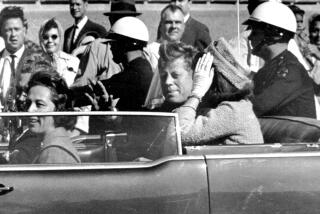To the Editor:
- Share via
George C. Herring’s review (Book Review, May 11) applauds Robert Schulzinger’s attack on my film “JFK” as “grotesquely fictionalized” and asserts “There is not one shred of evidence that JFK planned to extricate the United States [from Vietnam].”
Not true. Whether it is the stark difference between John F. Kennedy’s National Security Action Memorandum 263, ordering the first withdrawal of 1,000 American advisors and Lyndon Johnson’s reversal of that order in NSAM 273; or career military historian John Newman’s well-researched book, “JFK and Vietnam”; or Robert McNamara’s recent apologia, there is ample evidence that Kennedy was prepared to reverse course and extricate the United States from Vietnam.
Arthur Schlesinger Jr., no fan of my film, has, however, defended its central thesis: that Kennedy, wary of the bad advice he was getting from the military (from the Bay of Pigs to the Cuban Missile Crisis), was moving toward a less-confrontational approach to the Soviet Union, Cuba and Vietnam.
We will never know for sure what Kennedy would have done had he lived nor how different our country might have been. But to assert so presumptuously that all the evidence proves that Kennedy would have pursued the same devastating policy in Vietnam that Johnson and Nixon did is a disservice to both history and historical scholarship.
Oliver Stone, Santa Monica
****
To the Editor:
In his review (Book Review, May 11) of Robert D. Schulzinger’s book, “A Time for War,” George C. Herring is either unaware of the existence of National Security Action Memo 263 or Robert McNamara and Maxwell Taylor’s document, “Military Recommendations to the President,” which written in 1962, urged the “withdrawal [of] 1,000 U.S. personnel by the end of 1963 . . . making it possible to withdraw the bulk of U.S. personnel by 1965,” and he is unqualified to be writing as an authority on the Vietnam War, or he is dissembling. I suspect the latter. It would appear that he is propagandizing on behalf of what has been termed “the plausible public narrative.” For the Times to print such a misstatement of fact is irresponsible in the extreme.
Michael Rider, Idyllwild
****
George C. Herring replies:
I am quite familiar with the sources both Stone and Rider cite--and unconvinced by them. John Newman bases his case on circumstantial evidence; McNamara and Schlesinger base theirs largely on faith.
I did not assert or mean to imply that Kennedy would have followed the same course Johnson did with the same results. On the contrary, I entirely agree with Stone that we cannot know what Kennedy would have done had he lived.
I believe, therefore, that we should judge him primarily on the basis of what he did rather than what we think he might have done. During his brief tenure in office, the number of United States advisors increased from roughly 700 to more than 16,000 and Americans became actively and surreptitiously involved in combat. America’s rhetorical commitment to Vietnam escalated measurably. And by giving the green light to the coup that overthrew Ngo Dinh Diem in November 1963, JFK assumed a direct responsibility for the South Vietnamese government that the United States did not have before.
Whatever he might have done had he lived, Kennedy bequeathed to his successor a situation eminently more difficult and dangerous than the one he had acquired from Eisenhower.
More to Read
Sign up for our Book Club newsletter
Get the latest news, events and more from the Los Angeles Times Book Club, and help us get L.A. reading and talking.
You may occasionally receive promotional content from the Los Angeles Times.







